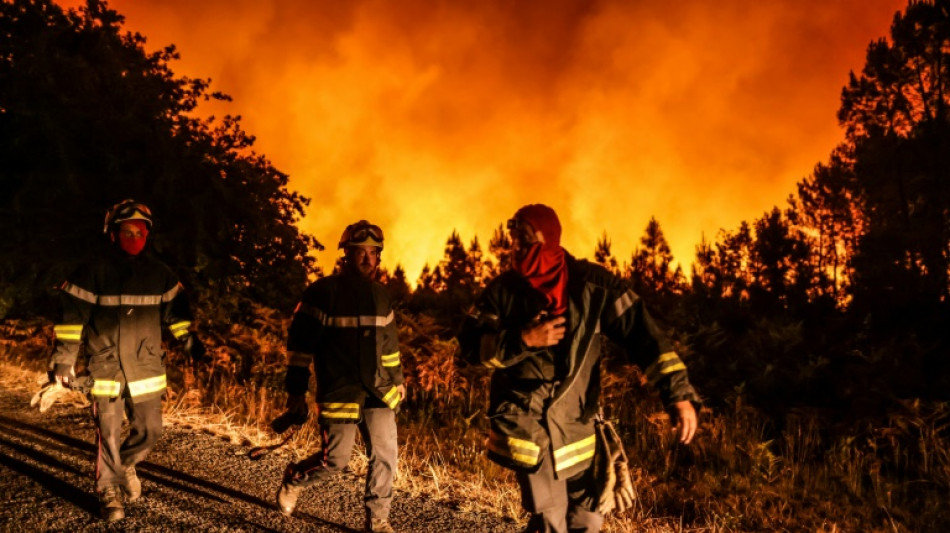
-
 Late Guirassy winner for Dortmund trims Bayern's lead atop Bundesliga
Late Guirassy winner for Dortmund trims Bayern's lead atop Bundesliga
-
'Free the mountains!": protest in Milan over Winter Olympics

-
 Gyokeres double helps Arsenal stretch Premier League lead
Gyokeres double helps Arsenal stretch Premier League lead
-
Six Nations misery for Townsend as Italy beat sorry Scotland

-
 Spain, Portugal face fresh storms, torrential rain
Spain, Portugal face fresh storms, torrential rain
-
Opinions of Zuckerberg hang over social media addiction trial jury selection

-
 Over 2,200 IS detainees transferred to Iraq from Syria: Iraqi official
Over 2,200 IS detainees transferred to Iraq from Syria: Iraqi official
-
Norway's Ruud tops Olympic men's freeski slopestyle qualifying

-
 Czech qualifier Bejlek claims first title in Abu Dhabi
Czech qualifier Bejlek claims first title in Abu Dhabi
-
French duo reach Shanghai, completing year-and-a-half walk

-
 Australian snowboarder James eyes elusive Olympic gold
Australian snowboarder James eyes elusive Olympic gold
-
Sequins and snow: Eva Adamczykova makes Olympic return

-
 Vonn set for Olympic medal bid after successful downhill training
Vonn set for Olympic medal bid after successful downhill training
-
Shepherd takes hat-trick as West Indies beat Scotland in T20 World Cup

-
 Sausages will sell after thrill-seeker Von Allmen wins Olympic downhill
Sausages will sell after thrill-seeker Von Allmen wins Olympic downhill
-
Swiss racer Von Allmen wins first gold of Winter Olympics

-
 'Wake up': Mum sparks comeback after scare for freeski star Gu
'Wake up': Mum sparks comeback after scare for freeski star Gu
-
Von Allmen wins men's Olympic downhill gold, first of Games

-
 First medals up for grabs at Winter Olympics
First medals up for grabs at Winter Olympics
-
Afghanistan captain Khan harbours dream of playing in Kabul

-
 Lindsey Vonn completes second Winter Olympics downhill training run
Lindsey Vonn completes second Winter Olympics downhill training run
-
Freeski star Gu survives major scare in Olympic slopestyle

-
 Iran FM looks to more nuclear talks, but warns US
Iran FM looks to more nuclear talks, but warns US
-
Hetmyer's six-hitting steers West Indies to 182-5 against Scotland

-
 After boos for Vance, IOC says it hopes for 'fair play'
After boos for Vance, IOC says it hopes for 'fair play'
-
Thousands gather as Pakistan buries victims of mosque suicide attack

-
 Lindsey Vonn completes second downhill training session
Lindsey Vonn completes second downhill training session
-
US pressing Ukraine and Russia to end war by June, Zelensky says

-
 Faheem blitz sees Pakistan avoid Netherlands shock at T20 World Cup
Faheem blitz sees Pakistan avoid Netherlands shock at T20 World Cup
-
Takaichi talks tough on immigration on eve of vote

-
 England's Salt passed fit for T20 World Cup opener
England's Salt passed fit for T20 World Cup opener
-
Spain, Portugal brace for fresh storm after flood deaths

-
 Pakistan bowl out Netherlands for 147 in T20 World Cup opener
Pakistan bowl out Netherlands for 147 in T20 World Cup opener
-
Pushed to margins, women vanish from Bangladesh's political arena

-
 Crypto firm accidentally sends $40 bn in bitcoin to users
Crypto firm accidentally sends $40 bn in bitcoin to users
-
Pistons end Knicks' NBA winning streak, Celtics edge Heat

-
 Funerals for victims of suicide blast at Islamabad mosque that killed at least 31
Funerals for victims of suicide blast at Islamabad mosque that killed at least 31
-
A tale of two villages: Cambodians lament Thailand's border gains

-
 Police identify suspect in disappearance of Australian boy
Police identify suspect in disappearance of Australian boy
-
Cuba adopts urgent measures to address energy crisis: minister

-
 Not-so-American football: the Super Bowl's overseas stars
Not-so-American football: the Super Bowl's overseas stars
-
Trump says US talks with Iran 'very good,' more negotiations expected

-
 Trump administration re-approves twice-banned pesticide
Trump administration re-approves twice-banned pesticide
-
Hisatsune leads Matsuyama at Phoenix Open as Scheffler makes cut

-
 Beyond the QBs: 5 Super Bowl players to watch
Beyond the QBs: 5 Super Bowl players to watch
-
Grass v artificial turf: Super Bowl players speak out

-
 Police warn Sydney protesters ahead of Israeli president's visit
Police warn Sydney protesters ahead of Israeli president's visit
-
Simi Khanna Launches Simi Beauty SK: A Natural Skincare Line Blending Luxury, Wellness, and Purpose

-
 Best Gold IRA Companies February 2026 Announced (Top Gold-backed IRA Companies Revealed)
Best Gold IRA Companies February 2026 Announced (Top Gold-backed IRA Companies Revealed)
-
Bolivia wants closer US ties, without alienating China: minister


Europe's fiery summer: a climate 'reality check'?
Wildfires and storms. Rivers at record lows. Parched crops withering in the fields. For many Europeans, this year's scorching summer means climate change is increasingly hard to ignore.
After months of cloudless days and drought, the weather has been one of the major themes of media coverage -- and discussions during family gatherings -- over the annual August holiday period.
"This summer has seen a series of extreme weather events," French government spokesman Olivier Veran told a first press conference after he and the government returned to the office last week.
It had been a "complete reality check, even for the most sceptical," he said.
France experienced its second-hottest summer on record, its driest one since 1976 and the worst in terms of the loss of forestry to wildfires since 2003, he said.
In recent months, some French villages have needed to be supplied with water trucks as their usual sources have dried up. Fires have repeatedly ravaged pine forests near Bordeaux.
Even in the normally verdant Alps, cheese makers complain that their cows are producing less milk than usual because their pastures are dried up.
The picture is similar across Europe.
In Italy, the collapse of the country's largest Alpine glacier in July sparked an avalanche that killed 11 people.
"The year 2022 in terms of extreme climate events is code red," said the head of environmental group Legambiente, Stefano Ciafani, in an August report.
After a punishing drought, around 400 Spanish wildfires destroyed 290,000 hectares (72,000 acres) of forest -- way above the recent average of 67,000 hectares a year.
As reservoir water levels plunged, a previously flooded centuries-old church and a huge megalithic complex emerged from their depths.
And a year after shocking major floods that claimed more than 180 lives in Germany, the country saw the Rhine river -- a crucial trade route -- shrink to levels that were barely navigable.
- Jets and steak -
The question for experts and campaigners is how much the sweltering summer of 2022 will translate into political change and lifestyle shifts from consumers.
As people return to work, France's green EELV party has been setting the news agenda with eye-catching proposals to crack down on executive jets as well as private swimming pools.
"We've just lived through a summer when we've seen the real impact of climate change for the first time and what are we doing? What are we prepared to do?" said leading MP Sandrine Rousseau.
She found herself at the centre of a national furore this week after suggesting men needed to cut down on emissions-heavy barbecued steak which they saw as a "symbol of virility."
"What has become quite obvious is that climate impacts and climate hazards are happening throughout Europe to differing degrees and with differing hazards," Carolina Cecilio from the E3G think-tank told AFP.
"It's not limited to southern Europe, which is more used to periods of drought and forest fires," she added.
Greater awareness in big EU member states such as France, Germany and Italy could help "shape the political agenda," Cecilio said.
- Energy crisis -
Some campaigners see an opportunity for real change in the energy crisis that has gripped Europe since Russia began turning off its gas deliveries following its invasion of Ukraine.
"I think that the scale and the coming together of overlapping crises should drive us to really question our use of energy," Lola Vallejo from the IDDRI think-tank told AFP.
"We can only hope that the summer we've just lived through will play a role in accelerating our collective will," said Vallejo.
But a working paper from the Organisation for Economic Cooperation and Development in June laid bare the scale of the challenge.
Analysing survey results from 20 mostly rich countries, its experts concluded that climate change awareness was high, with 60-90 percent of people understanding it was caused by human activity.
The problem was their willingness to change.
"Respondents were generally unwilling to limit their beef or meat consumption significantly. Few are willing to limit driving or heating or cooling their homes by a lot," the authors wrote.
Italy's elections on September 25 will be a test of how much climate change has really hit home, with campaigning so far dominated by worries about the cost of living.
Polls suggests that the next government could be a coalition of far-right and right-wing parties who have put it low on their agenda.
G.Stevens--AMWN


